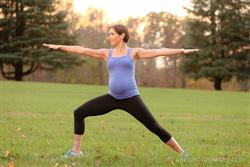By Emily Saunders, ME Certified Nutrition and Fat Loss Coach and co-founder of Momsanity
While the days are long gone that doctors frown upon exercising while pregnant, there is quite a bit of confusion surrounding effective and safe exercise during pregnancy. The trickiest part, is like non-pregnant women, the fitness levels of pregnant women vary widely and there is no hard and fast set of standards or recommendations for exercise during pregnancy. Because of this, it is always a good idea to run any new exercise program by your healthcare provider before getting started.
Fortunately the tide is changing and pregnant women are no longer encouraged to sit around and prop their feet up for months on end. More and more studies are coming out each year, regarding the benefits of exercise. The benefits of safe exercise during pregnancy when, far outweigh the risks and include: increased energy, easier and shorter labor and delivery, lower risk of excess weight gain, fewer back aches, significantly reduced risk of requiring a Ceserean, quicker recovery post-pregnancy, lower risk of gestational diabetes, lower risk of pre-eclampsia and many many more!
The question is- how can a pregnant woman safely workout while making sure she doesn’t harm herself or her baby? Fortunately the pregnant body protects itself to some extent and provides us with a lot of feedback as to whether we are over exerting ourselves. For example, women become breathless much more quickly due to increased blood volume, forcing the body to refrain from pushing itself as hard as the woman could have pre-pregnancy. Additionally, muscles tire more easily and fatigue sets in earlier during pregnancy.
Regardless of fitness level prior to pregnancy there are precautions that need to be taken. The pregnant body is strong, powerful and resilient but also delicate. The most important thing that pregnant woman can do is to listen carefully to the feedback from her body. Most precautions truly are common sense. Pregnant women should not engage in contact sports or adventure sports where falling is a risk. Pregnant women should stop exercising at the onset of any dizziness, bleeding, pain, lightheadedness or nausea and consult their doctors. This does not mean that she must refrain from exercising throughout pregnancy, but does warrant a conversation with her doctor or midwife.
There are many many myths surrounding exercise and pregnancy that need to be addressed and put away for good. Some of them include:
1. Pregnant women should not allow their heart rate to rise above 140 BPM.
While the medical community has largely moved beyond this myth, it is still alive and well. Both genetics and personal fitness level contribute to an individual’s maximum heart rate so choosing an arbitrary number is not very useful. A better gauge for expecting women is the Rate of Perceived Exertion (RPE) which uses a scale from 1-10. Pregnant women should keep their maximum efforts in the 7-8 range which means that carrying on a conversation would be difficult but not impossible.
2. If one is not already exercising, then she should not start during pregnancy.
There is no evidence based study that suggests that moderate exercise, such as walking, is unsafe during pregnancy. In reality, inactivity is a much greater hazard as it contributes to excess weight gain, high blood pressure, gestational diabetes, aches and pains and a higher risk for Cesearn. Most experts recommend 30-60 minutes of walking per day for pregnancies with no complications.
3. Very fit women must significantly reduce intensity during pregnancy.
As mentioned previously, the pregnant body protects itself. Even very fit women will begin to feel fatigued and breathless at a lower intensity that pre-pregnancy. Assuming that women pay close attention to how they feel, refrain from become over heated and breathless and avoid contact sports, high intensity exercise like running and weight training can be continued throughout a complication free pregnancy.
4. Weight Training should be avoided during pregnancy due to risk of injury.
Weight training is excellent for the pregnant body. Pregnant women need to maintain muscle strength to avoid back pain and poor posture and to prepare for labor and delivery. While no pregnant woman should aim to max out her bench press during pregnancy, moderate weight training is encouraged. Of course any weight training needs to be done with your baby’s safety in mind. Therefore, do not do any lifts that could potentially drop on your abdominal area or that overly-challenge your balance.
A recent 12-week study tracked 32 women starting at weeks 21 to 25 of their pregnancies. They worked out twice a week, increasing the amount of weight lifted by an average of 36 percent during the study. Not one of the women got injured. A dozen incidents of dizziness, headache and pelvic pain were reported, especially in the early weeks, as the women learned proper breathing technique. The women’s blood pressure did not rise, either during the workouts or over the course of the study. However, intense weight training can increase blood pressure, so it’s important to keep lifting intensity moderate and stop at the first sign of dizziness. Women who are new to weight training should seek guidance from a trained professional.
Just like each woman’s body is unique so is each and every pregnancy. Pregnant women should seek approval from their medical providers before starting any new exercise program. While pregnancy is not an illness, it is a unique experience that must be readily monitored. Careful self assessment and regular conversations with care providers and prenatal fitness experts are of utmost importance to help ensure safety and effectiveness of any workout program.
Done with pregnancy and ready to get back into more intense exercise but can’t find time for the gym? NO WORRIES! It’s almost October which means brand new quick and effective (10, 15, and 20 minute) at home workouts in the Momsanity Sisterhood. Click HERE for more details!
















